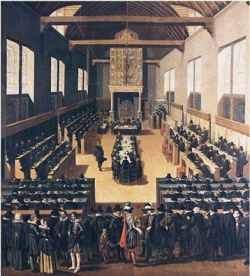 Synod condemns those . . .
Synod condemns those . . .
VII Who teach that in this life there is no fruit, no awareness, and no assurance of one's unchangeable election to glory, except as conditional upon something changeable and contingent.
For not only is it absurd to speak of an uncertain assurance, but these things also militate against the experience of the saints, who with the apostle rejoice from an awareness of their election and sing the praises of this gift of God; who, as Christ urged, rejoice with his disciples that their names have been written in heaven (Luke 10:20); and finally who hold up against the flaming arrows of the devil's temptations the awareness of their election, with the question Who will bring any charge against those whom God has chosen? (Rom. 8:33).
____________________________________
Like Roman Catholic theology, which argues that any notion of the assurance of salvation inevitably leads to presumption and laxity in the Christian life (the sin of presumption), so too, Arminians have argued that the ground of election is to be located in a Christian’s personal performance (faith and good works).
According to the Canons and Decrees of the Council of Trent, “No one...so long as he lives this mortal life, ought to regard to the sacred mystery of divine predestination, so far presume as to state with absolute certainty, that he is numbered of the predestined, as if it were true that the one justified either cannot sin any more, or, if he does sin, that he ought to promise himself an assured repentance. For except by special revelation, it cannot be known who God has chosen to Himself.” (Sixth Session, Chapter XII). As Rome sees the matter, no one can know that they are numbered among the elect. This lack of assurance supposedly motivates the faithful to lead godly lives and to persevere in good works to the end of their lives, so that they may be saved. In this scheme, the proper motivation for perseverance and good works is the fear of divine chastisement and/or eternal punishment. Clearly, Rome was afraid that believers who possessed assurance of their salvation would become morally lax, and live lives indifferent to good works and holy living.
Some Arminians have taken a very similar position. According to a work by Calvary Chapel pastor George Bryson, “by reducing perseverance to an inevitability all of the words of encouragement and warning are in a real sense wasted. But in Scripture, perseverance in holiness to the end is seen as the challenge and the goal of the Christian life. It should not be taken for granted. To say that perseverance is what we will do because we are true believers is to radically redefine the meaning of perseverance. Instead we need to see perseverance as what we ought to do because we are true believers. God is more than able and willing to help us persevere in holiness and faith. The question is are we willing to let Him help us persevere?” (George Bryson, The Five Points of Calvinism, 113).
For the Arminian, if the Christian believes, repents, and then lives a godly life unto the end, election is seen to be absolute and final. The Arminian argues that this must be the case, or else Christians will mistakenly presume that they are of the elect, and will not live godly lives, nor seek God’s favor as they ought. According to someone like Bryson, the Reformed view of election removes all incentive for both evangelism and good works. It was none other than John Wesley who argued that George Whitefield’s view of predestination (Reformed) was in error, since Whitefield’s Calvinism supposedly undermined the basis for the Christian life, which was, according to Wesley, fear of punishment and hope of reward. It is with this in mind that the Arminians will challenge the Reformed to make sense of the warnings throughout the Scriptures for believers to persevere.
The Canons are quick to point out that the exact opposite state of affairs is taught us in Holy Scripture. It is the believer’s assurance of salvation which serves as the basis for the good works we perform! As the authors of the Canons put it: “For not only is it absurd to speak of an uncertain assurance, but these things also militate against the experience of the saints, who with the apostle rejoice from an awareness of their election and sing the praises of this gift of God; who, as Christ urged, rejoice with his disciples that their names have been written in heaven (Luke 10:20); and finally who hold up against the flaming arrows of the devil's temptations the awareness of their election, with the question Who will bring any charge against those whom God has chosen? (Rom. 8:33).”
This is also the clear teaching of John’s Gospel (John 15:1-16):
“I am the true vine, and my Father is the vinedresser. 2 Every branch in me that does not bear fruit he takes away, and every branch that does bear fruit he prunes, that it may bear more fruit. 3 Already you are clean because of the word that I have spoken to you. 4 Abide in me, and I in you. As the branch cannot bear fruit by itself, unless it abides in the vine, neither can you, unless you abide in me. 5 I am the vine; you are the branches. Whoever abides in me and I in him, he it is that bears much fruit, for apart from me you can do nothing. 6 If anyone does not abide in me he is thrown away like a branch and withers; and the branches are gathered, thrown into the fire, and burned. 7 If you abide in me, and my words abide in you, ask whatever you wish, and it will be done for you. 8 By this my Father is glorified, that you bear much fruit and so prove to be my disciples. 9 As the Father has loved me, so have I loved you. Abide in my love. 10 If you keep my commandments, you will abide in my love, just as I have kept my Father's commandments and abide in his love. 11 These things I have spoken to you, that my joy may be in you, and that your joy may be full. 12 “This is my commandment, that you love one another as I have loved you. 13 Greater love has no one than this, that someone lay down his life for his friends. 14 You are my friends if you do what I command you. 15 No longer do I call you servants, for the servant does not know what his master is doing; but I have called you friends, for all that I have heard from my Father I have made known to you. 16 You did not choose me, but I chose you and appointed you that you should go and bear fruit and that your fruit should abide, so that whatever you ask the Father in my name, he may give it to you.”
According to Jesus, the elect are chosen for the purpose of bearing fruit, not the other way around!
People who live in fear of God are not energized to do good works. Instead, they are paralyzed! They live and act in fear. Since they are never sure of God’s favor toward them, any works they perform are based upon fear, and do come not from the gratitude arising from true faith. Even worse, such works are often performed in an attempt to leverage favor from God. As sinners, we all want more crowns and a bigger mansion! Often times people laboring under the Roman-Arminian misconception, may even end up doing their works with the goal of being saved in the end. Tragically, this leads to the real matter of presumption here, namely someone who believes that their "good" works will actually save them! Now that is the height of presumption!
It is only a Christian, who has the certain hope of heaven, who is truly free to obey the commandments of God! The Reformed have always argued that the warnings in Scripture are indeed valid, and the elect heed these warnings! The elect hear the shepherd’s voice! They believe the gospel. They flee to Christ when they fall into sin or struggle with doubt.
It must also be said that the Bible knows nothing of a person numbered among the elect, who will not be justified, and sanctified, before reaching glorification. At some point, the elect will indeed come to faith and be justified. And through the same act of faith which justifies, the life-time process of sanctification immediately begins. God begins the work (election). God sustains his work in time and space (faith and its fruits, repentance and good works). God sees it through to the end (perserverence)! Indeed, believers persevere not because we are strong enough, but because God is strong enough! We persevere, not because of our faith, but because of God’s faithfulness. We persevere not to be numbered among the elect, but because we are already numbered among the elect.
Tragically, it is Romanism and Arminianism which lead to a life of fear and doubt, not faith and a life of gratitude. As the author to the Hebrews proclaims, “without faith, it is impossible to please God.” Through faith in Christ, we are covered by the perfect righteousness of Jesus Christ himself, and therefore every work which we perform--no matter how selfish or tainted by sin that work may be--is pleasing to God. Why? Because God cannot turn aside the righteousness of his Son in which we are clothed!
 Thursday, June 5, 2008 at 02:41PM
Thursday, June 5, 2008 at 02:41PM  Synod condemns the error of those . . .
Synod condemns the error of those . . .









